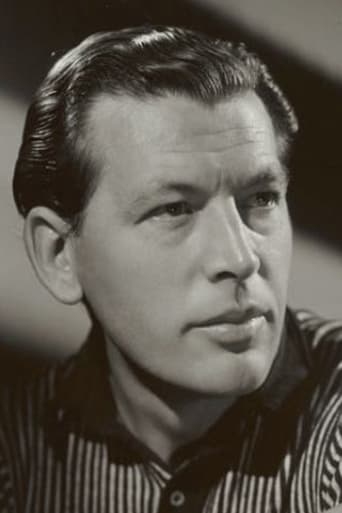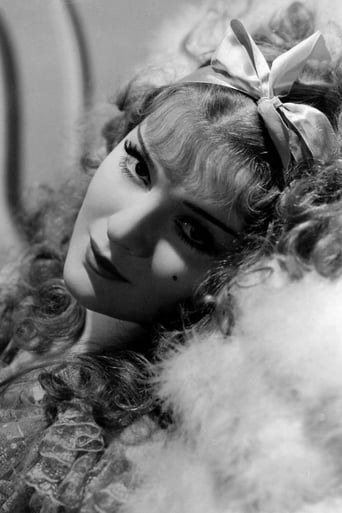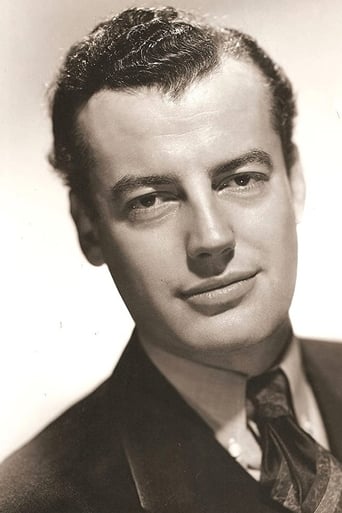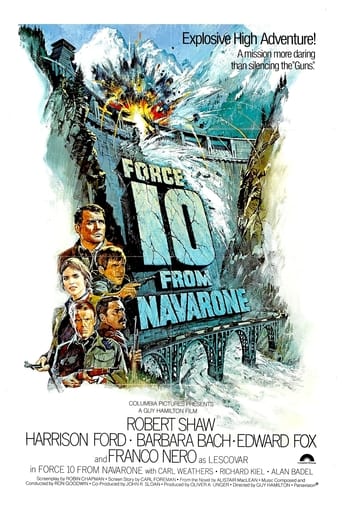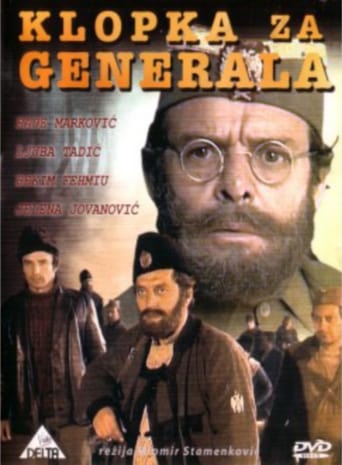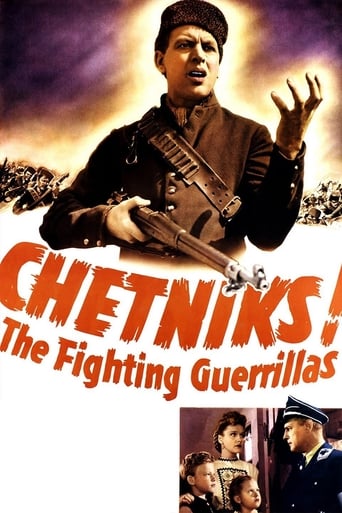
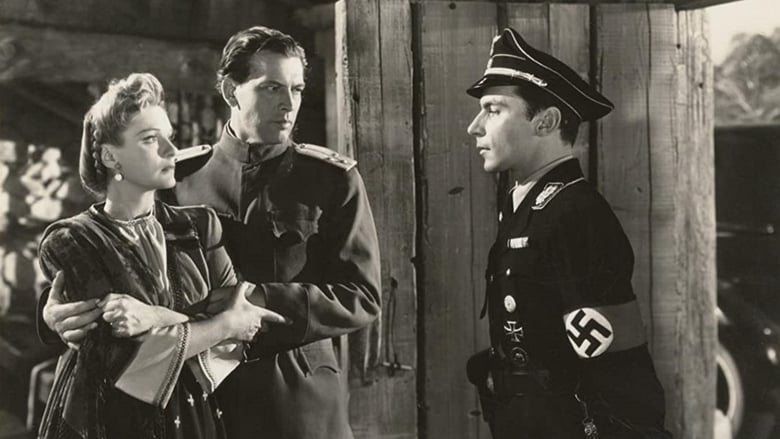
Chetniks! (1943)
Subtitled The Fighting Guerillas, Chetniks tells the story of Yugoslavian guerilla fighter General Draja Mihailovitch. Based on the General's own memoirs, the film depicts Mihailovitch (played here by Philip Dorn) as a selfless idealist, leading his resistance troops, known as the Chetniks, on one raid after another against the Germans during WW II.
Watch Trailer
Cast
Similar titles
Reviews
Good movie but grossly overrated
A Disappointing Continuation
When a movie has you begging for it to end not even half way through it's pure crap. We've all seen this movie and this characters millions of times, nothing new in it. Don't waste your time.
Through painfully honest and emotional moments, the movie becomes irresistibly relatable
Chetniks :The Fighting Guerrillas : 1943This Twentieth Century Fox production from 1943 is the story of Serbian Colonel, Draja Mihailovitch. Mihailovitch was an officer in the Royal Yugoslav Army. He refused to surrender after the country was gobbled up by the German attack in the spring of 1941. He retreated to the Serbian hills and started a guerrilla campaign against the occupying German and Italian forces. The film shows Mihailovitch as an inspiring leader who masterfully beats the Germans, in between stopping here and there to give patriotic speeches. The lead is played by Philip Dorn with support by Anna Sten, as his wife, while Sheppard Strudwick, Frank Lackteen and LeRoy Mason are his trusty lieutenants. The Germans are played by Felix Basch and the always entertaining, Martin Kosleck. The film follows Dorn as he plays a dangerous game of cat and mouse with the Germans, always staying one foot ahead of them. That is till the Axis manage to get their paws on his wife, Sten and his two young children, Patricia Prest and Merrill Rodin. Gestapo type, Kosleck of course takes great delight in taunting Dorn with this bit of info.Kosleck tells Dorn he intends to slaughter every man, woman and child in a town if Dorn does not turn himself in. This of course includes killing Dorn's flesh and blood. Dorn agrees to the exchange but of course has other plans. He fools the Germans into believing that his forces have scattered to the hills. The German quickly set off in pursuit, intending to wipe them out. Needless to say it is really a trap by the partisans to do in the Germans. At the same time, Dorn has led another group to the town in order to save the townsfolk. The guerrillas overrun the Germans, free the people and put paid to the Gestapo swine, Kosleck. This one has its moments, with several well mounted battle scenes, but as a whole, there is a tad too much flag waving. The acting is OK, though Dorn is a bit more stoic than he needed to be. Kosleck of course steals the show as the evil Nazi. Look close and you will catch future HOGAN'S HEROES, star, John Banner, in a brief uncredited bit as a Gestapo man. Pretty Virginia Gilmore has a decent role here as a spy for the Chetniks. The soon to be Mrs. Yul Brynner would soon be relegated to secondary roles and early television productions.The film did decent box office when released in 1943. It was yanked out of circulation fairly quickly in 1946. Mihailovitch had been arrested, tried and executed for war crimes by Marshal Tito's Communist regime. It seems that the Chetniks had been up to a bit of ethnic cleansing against the local Croats and Muslims. Tito was also not amused that the Chetniks had clashed with the Communist groups during the war. Mihailovitch's men did help numerous downed Allied airmen escape back to the west. But even the British had yanked their help from the group by the end of 1944. Some claim he was framed, but most historians seem to think he was not quite the knight in shining armor this film suggests. The film was helmed by b-unit man, Louis King. King's best films are likely, POWDER RIVER, TYPHOON and THUNDERHEAD- SON OF FLICKA. He also directed several BULLDOG DRUMMOND films and a CHARLIE CHAN flick. The look of the film is quite good, with one time Oscar nominated, Glen MacWilliams handling the cinematography duties. MacWilliams received his Oscar nod for lensing Hitchcock's LIFEBOAT the following year.
This is a story about a man, who ran the first resistance in Europe. A man that later on will be deserted by all of his allies because he had put national interest before any other. True Serbian hero, fighting and dying for his country and democratic cause. Yes, he was fighting against Communists, Nazis and Ustashe (croatians who performed the most monstrous genocide against Serbians). He did fought together with Italians in Dalmatia to protect Serbian population, but never on the same side with Germans. There were some divisions of Chetniks that did fight along with Germans but they were not under his command (Kosta Pecanac). During the II WW, he received a medal from president Truman for his "fight for democratic cause and freedom". After the war, because of the political games run by Soviets and English, his movement lost the support from the allies and he was left alone to fight against the enemies. His movement saved from certain death so many American airmen, and they wanted to save him, realizing that he would get murdered but he refused saying :"This is my country, i would die in my country". Anyway, president of the USA and survived American pilots did not forget him building a monument in his honor after the war.
I saw the movie just before going into service, little dreaming that I would see Gen. Draja Mihailovich in person. It is an excellent movie, well acted. I volunteered with the OSS (Office of Strategic Services) and parachuted into Mihailovich territory to rescue airmen shot down bombing the oilfields of Ploesti. The mission was called Operation Halyard and is depicted in the book, The Forgotten 500. The movie is an excellent depiction of the Serbs resistance to the German invasion. It has been a long time since I saw the movie and I have forgotten much of it, but, if you like adventure and romance, it has both. Today, there is much controversy surrounding Mihailoich, and this is an excellent source to get one viewpoint.
On January 11, 1943, Twentieth Century Fox released the movie Chetniks! The Fighting Guerrillas on the Serbian guerrilla movement headed by Draza Mihailovich in German-occupied Yugoslavia. The movie was a box office and critical success, starring Philip Dorn as Draza Mihailovich and Anna Sten as his wife. The movie was the Hollywood chronicle of the Chetnik resistance movement.Draza Mihailovich launched a resistance movement against the Nazi occupation forces of Yugoslavia in 1941. This was unprecedented and created a sensation in Europe and in America. In America, Draza Mihailovich became one of the most popular figures in the news. In the May 25, 1942 issue of Time Magazine, Mihailovich was on the cover under the heading, "Mihailovich: Yugoslavia's Unconquered." He was one of the major contenders for the title of Time's Man of the Year. As a result, in 1942, a Hollywood movie was made by a major studio, Twentieth-Century Fox, called Chetniks!—The Fighting Guerrillas which portrayed Draza Mihailovich and his forces as allies of the US. The film starred Dutch-born Philip Dorn as Draza Mihailovich. He played Papa Lars Hanson in the 1948 classic I Remember Mama, nominated for 5 Academy Awards. Russian-born Anna Sten, Samuel Goldwyn's answer to Greta Garbo, was his wife, Lubitca Mihailovitch. The movie was produced by Bryan Foy and Sol M. Wurtzel, who had been one of the top executives at William Fox's studio.The movie was directed by Louis King, a director best known for directing the My Friend Flicka sequels in the 1940s, Thunderhead—Son of Flicka (1945) and Green Grass of Wyoming (1948), which received an Academy Award nomination, the Bulldog Drummond series of films, Charlie Chan in Egypt (1935) with Warner Oland and Rita Hayworth, and a series of low budget B westerns in the 1920s and early 1930s, the most notable of which were made at Joseph P. Kennedy's Film Booking Offices of America movie studio (FBO) in the 1920s.The screenplay was written by Jack Andrews and Edward E. Paramore, Jr., based on the original story by Andrews. The movie was well-written, based on the facts of Draza Mihailovich's life. Andrews and Paramore are able to capture what motivates Mihailovich in the following dialogue from the movie: Lubitca Mihailovitch: The Germans say, "It is only a matter of time until we catch you!" Draja Mihailovitch: You don't believe that, do you? Lubitca: They're strong. They have so much.Draja: Yes, but we are stronger because we have something they never had: The will to be free. You see, our people don't like to be conquered. So they never will be.The film opens with a statement that the film is dedicated to Draza Mihailovich and the Serbian Chetnik guerrillas. In the opening scene, German bombers attack Yugoslavia and bomb Belgrade in 1941. German tanks and armored vehicles are shown invading and occupying Yugoslavia. Then Chetnik guerrillas are shown attacking German occupation troops and resisting the occupation by sabotage. A German officer who predicts an easy occupation and imminent conquest of Yugoslavia is shown being shot by Chetnik guerrillas.The movie takes place in the mountainous coastal city of Kotor in Montenegro. Draza Mihailovich and his Chetnik guerrillas are able to ambush and capture Italian occupation troops and officers. Mihailovich is portrayed as a real-life Zorro, who is able to outwit the Nazi war machine. A Gestapo officer, Col. Brockner, played by Martin Kosleck, is able to discover the identity of Mihailovich's two children, Mirko and Nada, and his wife, Lubitca. German forces then take them into custody to extort Mihailovich to surrender. The original musical score was by Hugo W. Friedhofer, who won the Academy Award for Best Musical Score for the classic World War II movie The Best Years of Our Lives (1946). Friedhofer had also been the musical arranger on Casablanca and Now, Voyager in 1942. The cinematography was by Glen MacWilliams. The film editing was by Alfred Day.The New York Times reviewed the movie favorably on March 19, 1943 after it was shown in New York at the Globe in a review by "T.M.P." (Thomas M. Pryor). The New York Times called the movie "splendidly acted" and that it had "the right spirit". Hal Erickson of All Movie Guide (AMG) reviewed the movie favorably as well, noting how Mihailovich was vindicated. Erickson wrote that the movie portrayed Mihailovich as "a selfless idealist, leading his resistance troops, known as the Chetniks, on one raid after another against the Germans during WWII."Chetniks! The Fighting Guerrillas was reviewed positively in the Los Angeles entertainment trade paper The Hollywood Reporter when released in 1943: "Seldom has Hollywood given attention to a motion picture that offered more stirring material than this first feature about a living military hero of World War II."In a review in the Chicago Daily Tribune on April 1, 1943, "Chetniks' Story Is Dramatically Told in Movie 'CHETNIKS'", Mae Tinee wrote: "This is a fiercely satisfying picture. We all know about the Chetniks, fighting guerrillas of JugoSlavia. We devour every word we can find to read about them--and a lot of us dream of them.... Now comes the movie ..."The film remains unavailable on DVD in the US in large part because the role of Mihailovich in World War II was rewritten and revised and falsified after the war. The movie is no longer politically correct.Chetniks! The Fighting Guerrillas documents and dramatizes a remarkable and unique moment in the history of World War II. It captures a special moment in time. This is a movie that deserves to be recognized as an important film of World War II.
